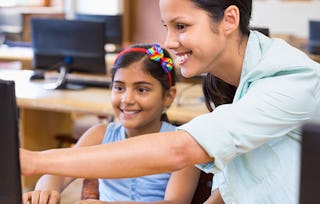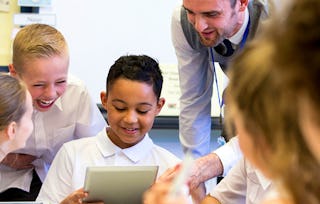The Foundations of Teaching for Learning programme is for anyone who is teaching, or who would like to teach, in any subject and any context - be it at school, at home or in the workplace. With dynamic lessons taught by established and respected professionals from across the Commonwealth, this eight course programme will see you develop and strengthen your skills in teaching, professionalism, assessment, and more. As you carry on through the programme, you will find yourself strengthening not only your skills, but your connection with colleagues across the globe. A professional development opportunity not to be missed.

Foundations of Teaching for Learning: Developing Relationships

Foundations of Teaching for Learning: Developing Relationships


Instructors: Dr Fawaz Shareef
24,257 already enrolled
Included with
1,074 reviews
Skills you'll gain
- Relationship Building
- Ethical Standards And Conduct
- Cultural Diversity
- Classroom Management
- Student Engagement
- Teaching
- Diversity Awareness
- Working With Children
- Community Outreach
- Parent Communication
- Skills section collapsed. Showing 9 of 10 skills.
Details to know

Add to your LinkedIn profile
See how employees at top companies are mastering in-demand skills

There are 6 modules in this course
Relationships are critical to everything we do. They impact on our learning and how we see the curriculum and its assessment. They make a difference to our learning by ourselves and with others. They will enable us to work well, or not so well, with other people in the school. This week we will look in detail at what relationships are and how they are formed. We look back briefly at something that was discussed in course five, that is, how to support the development of a growth mindset. We hope that right from the start you will be discussing the course content with another educator. Since our relationships for so much of the time involve other people, it is important to think about these things with others to enable us to practice some of the things that are talked about in the course.
What's included
4 videos4 readings1 assignment
This week we are going to focus on establishing relationships with students. We will start by considering the connections between how and what we think and how we behave. Sometimes we behave habitually, but sometimes, if we want to change our habits, we have to consciously make decisions about what to think or how to act. We will discuss how these two types of behaviour play out in the classroom and look at why one type is more productive. To take this a little bit further, we will explore the role that questions play in learning. We will also look at some of the strategies that you can use to develop positive relationships in the classroom, remembering that students are forming a range of relationships: relationship with themselves, with learning, with the curriculum content, with the teacher, with other students and with the wider community. Finally, we are going to talk about the need to behave ethically in the classroom, treating students with respect and ensuring that no harm comes to them. At the end of the week, you will write a short essay where you will consider the factors involved in establishing relationships and think about activities that you can use to improve student learning.
What's included
5 videos1 reading1 assignment1 peer review
This week we will focus on the concept of school improvement and effectiveness. There are several important factors that contribute to the success of a school. We will identify what these factors are, and look at each of them in detail. We start by looking at relationships, especially your relationships with your colleagues and school leaders. This will include a study of teacher unions and teacher associations, which both have a role in building professional relationships. Teacher unions offer a platform for development that will bring about educational reform. Next we will look at trust. We will explore what the concept of trust encompasses, and consider how certain behaviours can help to build trust. Finally, we look at working with leaders, teachers, and support staff. Here we will be looking at establishing Professional Learning Communities. At the end of this week we hope that you will be prepared to establish Professional Learning Communities and enhance you professional development.
What's included
4 videos1 reading1 assignment
This week we will consider the importance of establishing good relationships with the parents of your students. We will focus on why we need to involve parents in the education of their children and how we can go about it. The first two lectures are themed on the statement ‘The parent is the child’s first teacher’. These lectures focus on the important role that parents play in their child’s learning. We know that having children well prepared for the first day of school is an important first step for their learning. Teachers can play a role in reaching out to parents and giving them the information they need to give students the best chance of being successful. Weeks three and four look at the work of Joyce Epstein and her colleagues and their six different ways in which parents can be productively involved in their child’s education. These include the important roles of parenting, having good communication with the school, volunteering to do things in the school, helping their child learn at home, helping the school to make decisions about what it will do, and actively being involved in the community. At the end of this week you will be asked to write a short essay where you will consider the factors involved in establishing relationships with either other teachers and school administrators or parents.
What's included
5 videos1 reading1 assignment1 peer review
This week we consider the importance of looking beyond the school and establishing relationship with the outside community. Students are much more likely to do well if the community values education and provides good policies, appropriate levels of funding, and appropriate training for teachers. We will consider the difference between a regular school and a community school that involves its local community and considers it be a part of the school. We will look at some of the things that a community needs in order to support student learning and explore some ways in which schools can establish partnerships with their community. We will also consider 40 developmental assets that are related to student learning and success, as identified by the Search Institute in the United States. We also reflect on the importance of dialogue as a means of helping each other learn. This is one reason why we have been encouraging you to work in partnership with a colleague – either in your own setting or online – as you work through the ideas in this course. We hope you will either use professional conversations in your school setting or work with others online to enable dialogue that will help you learn.
What's included
4 videos1 reading1 assignment
This week you are going to have the opportunity to think about the issue of diversity in the classroom. Some of you might think that your classroom is not really a diverse place because all of the students come from your home country. However, diversity goes way beyond issues of nationality and culture. Diversity can include gender, socio-economic background, motivation to learn, and many other factors. We need to consider diversity very carefully if we are to have a classroom that is responsive to the various needs of our students.
What's included
5 videos1 reading1 assignment
Instructors


Offered by
Explore more from Education

Commonwealth Education Trust

Commonwealth Education Trust

Commonwealth Education Trust

Commonwealth Education Trust
Why people choose Coursera for their career

Felipe M.

Jennifer J.

Larry W.

Chaitanya A.
Learner reviews
- 5 stars
90.13%
- 4 stars
7.35%
- 3 stars
2.14%
- 2 stars
0.27%
- 1 star
0.09%
Showing 3 of 1074
Reviewed on Mar 26, 2020
Flexible learning process interesting and very worthwhile.
Reviewed on Sep 17, 2020
some of the video are really long so you lose some of the information
Reviewed on Jul 13, 2019
Positive vibration is good in teaching, for teachers and students to have a mutual understanding to develop a good relationship!

Open new doors with Coursera Plus
Unlimited access to 10,000+ world-class courses, hands-on projects, and job-ready certificate programs - all included in your subscription
Advance your career with an online degree
Earn a degree from world-class universities - 100% online
Join over 3,400 global companies that choose Coursera for Business
Upskill your employees to excel in the digital economy
Frequently asked questions
To access the course materials, assignments and to earn a Certificate, you will need to purchase the Certificate experience when you enroll in a course. You can try a Free Trial instead, or apply for Financial Aid. The course may offer 'Full Course, No Certificate' instead. This option lets you see all course materials, submit required assessments, and get a final grade. This also means that you will not be able to purchase a Certificate experience.
When you enroll in the course, you get access to all of the courses in the Specialization, and you earn a certificate when you complete the work. Your electronic Certificate will be added to your Accomplishments page - from there, you can print your Certificate or add it to your LinkedIn profile.
Yes. In select learning programs, you can apply for financial aid or a scholarship if you can’t afford the enrollment fee. If fin aid or scholarship is available for your learning program selection, you’ll find a link to apply on the description page.
More questions
Financial aid available,
¹ Some assignments in this course are AI-graded. For these assignments, your data will be used in accordance with Coursera's Privacy Notice.

